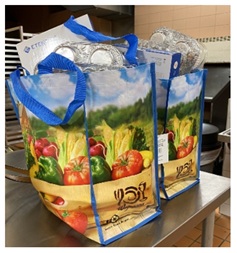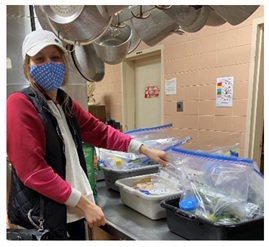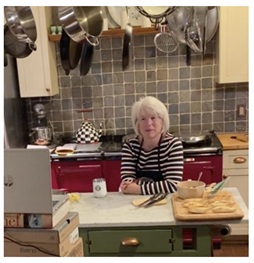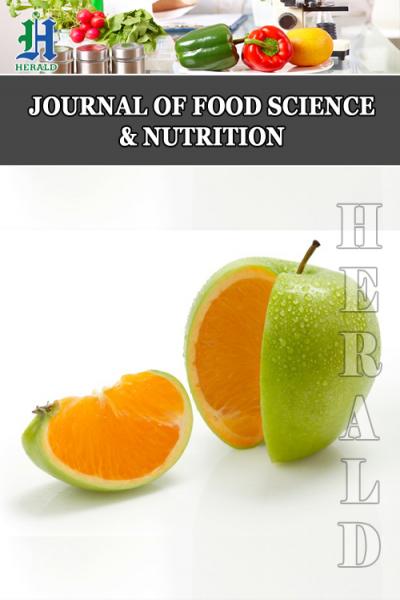
Implementing a Higher Education Food Science Laboratory Course during the Covid-19 Pandemic
*Corresponding Author(s):
Kathleen BorderNutrition And Dietetics, D’Youville College, Buffalo, NY, United States
Tel:+1 7168297543,
Email:borderk@dyc.edu
Abstract
When state regulations mandated the suspension of face-to-face classes in spring of 2020 due to the Covid-19 pandemic, it was apparent that plans needed to be leveraged to create rigorous, engaging learning experiences for students enrolled in dietetic program courses at D’Youville College in Buffalo, New York, specifically courses requiring food laboratory experiences. When this unique situation presented itself, the authors turned to a variety of resources to formulate and carry out their plan. The authors participated in nation-wide conference calls in spring and summer 2020, gleaning best practices from universities both large and small to apply in creating distance food science laboratory modules. During the summer of 2020, lab modules were designed to allow students to participate in food science experiments tailored for completion using standard kitchen appliances and equipment in student apartments, dormitory kitchens or in their home. Using a combination of existing food preparation equipment and items purchased specifically for the distance food lab, lab supply kits were assembled and distributed to students enrolled in the course for fall 2020 (n=8). Department faculty scheduled routine ingredient pick-ups throughout the semester with enrolled students. Ingredient kits and lab modules were individualized for students’ dietary needs such as vegan diets or food allergies. Students participated in a weekly lecture class in which provided content for the course as well as a demonstration of the module food lab experiments. Students then conducted the experiments over the course of one week in their home kitchens. Lab reports included photographs of completed labs, evaluation grids and student reflection. Student evaluations revealed a high degree of satisfaction with the course which they felt was well organized (83.33%), well-presented (83.33%) and met their expectations for intellectual stimulation (66.67%). This article will summarize the steps taken to create, implement, and evaluate a college level Food Science laboratory course administered during fall of 2020.
Keywords
Distance education; Food science laboratory
INTRODUCTION
Food science is the study of the physical, biological, and chemical makeup of food; the causes of food deterioration; and the concepts underlying food processing [1]. Food scientists and technologists apply scientific disciplines including chemistry, engineering, microbiology, and nutrition to the study of food to improve the safety, nutrition, wholesomeness and availability of food. Depending on their area of specialization, food scientists may develop ways to process, preserve, package, and/or store food according to industry and government specifications and regulations. Registered Dietitian Nutritionists (RDNs) apply principles of food science when planning and preparing food, educating consumers on food preparation and developing modified recipes to use in therapeutic diets. Competencies related to food science are required elements in dietetics education programs accredited by the Accreditation Council for Education Programs in Nutrition and Dietetics (ACEND) [2].
D’Youville is a private college located in Buffalo, New York. Founded in 1908, the Grey Nuns named the college after the Patron Saint Marguerite d’Youville to be a compassionate place of learning for those from underrepresented populations to give them a better life, a tradition that continues today. Recognizing the role of the Registered Dietitian Nutritionist (RDN) as the nutrition expert and the key role that nutrition plays in health and well-being, the Nutrition and Dietetics Program strives to serve the community by providing students with the knowledge, skills, and experience to meet the challenges of the diverse and changing field of nutrition and dietetics. Our intent is to prepare entry-level registered dietitian nutritionists who will become leaders in their field and will fulfill prominent and varied professional roles.
The D’Youville Program in Nutrition and Dietetics utilizes the integrated experiential learning model by combining innovative classroom experiences with diverse supervised practice opportunities. The program strives to create an equitable and inclusive teaching and learning environment to support student academic success, professional development, and personal growth. The food science course at D’Youville College (DYC) is a fundamental course providing basic principles of food preparation. Emphasis is on food chemistry, the function of ingredients, and food preparation skills. Course objectives are designed to enable students to:
- Describe the basic chemical changes that occur in foods as a result of the various handling procedures.
- Demonstrate the function of ingredients in a food system and the effects of altering the ingredient formulations.
- Explain the basic principles of food safety and preservation.
- Explain the basic method and principles of food evaluation.
- Discuss basic research methods for evaluating foods and preparation methods.
Typically, the course is delivered in a hybrid format with lecture materials and exams administered using distance learning and the laboratory (lab) sessions held in DYC’s Nutrition and Dietetics Kitchen Laboratory on campus. Students work together in groups of three or four and conduct simple experiments to apply the concepts from the weekly module, and often, complete a recipe to enjoy in a communal setting after the lab session. It is during this communal meal where students discuss the outcome of their experiments, and how they could apply the techniques learned in class to food preparation experiences. The delivery of this course drastically changed due to the Covid-19 pandemic, and guidelines in place at DYC for course delivery in the fall of 2020.
COVID-19 PANDEMIC AND CHANGES TO COURSE DELIVERY
In early March 2020, the DYC community was officially notified by DYC administration on the potential impact of Covid-19 and regularly scheduled campus activities. The virus, first identified in December 2019 in the city of Wuhan, Hubei Province, China, was identified in multiple other countries, including the United States. There were a small number of confirmed cases of COVID-19 in New York State [3]. The notice informed the DYC community of public health guidelines and the cancellation of planned study abroad experiences. Social distancing, face masks, hand washing/sanitizing and limiting the number of people in social groups were just a few of the key health considerations implemented. Within a few days, all on-campus classes were suspended, and courses were delivered via distance learning for a designated length of time, with plans to evaluate the situation by the end of March 2020 [4]. This plan was revised to extend distance learning for all classes through the end of the semester (May 2020). This was a time of significant uncertainty for faculty as they began to consider summer and fall course delivery [5,6].
Of concern was the consideration of how to implement food lab instruction in the upcoming semesters. Food labs at DYC are held in a kitchen facility space designed to provide experiences in quantity food preparation as well as “home-use” kitchen labs. Students work in small groups, of approximately 3-4 students to complete assigned lab experiences. After the lab, students gather around a communal table to sample the foods prepared during lab and to discuss their lab experiences. Concerns specific to food labs included: 1) students working together with limited “social distancing”, 2) the requirement of sampling food products produced in lab, which would require removal of face masks, 3) Food labs require frequent trips to local stores to obtain the ingredients needed for lab, potentially placing the instructor at increased risk for exposure to Covid-19.
DISTANCE FOOD SCIENCE LABORATORY: PLANNING, IMPLEMENTATION AND EVALUATION
Collaboration and planning
With these concerns in mind, department faculty realized decisions needed to be made regarding fall semester courses involving a food lab component. Faculty reviewed guidance provided by local health departments [7], national recommendations [8], institutional leadership [9,10] and published recommendations [11]. Faculty participated in nation-wide conference calls led by members of the Academy of Nutrition and Dietetics Council: Nutrition and Dietetic Educators of Practitioners (NDEP) [12]. During these calls, faculty representing programs from across the United States shared their strategies for food lab management. Best practices were gleaned from these calls and included management of food labs on and off campus.
Suggestions for on-campus labs included: 1) limit enrollment of students, 2) maintain social distancing, 3) suspend communal dining as a lab experience, 4) provide personal protective equipment such as face masks and gloves, as needed. Strategies for creating distance or “off-campus” food lab experiences were discussed. The suggestions for enabling students to conduct food science experiments in their off-campus living situation included: 1) provide supplies for basic food preparation for all students, 2) pre-portion ingredients to conduct simplified experiments and schedule supply pick-up at designated times and places on campus, 3) provide a list of possible experiments for students to complete and have them choose which ones to complete, 4) waive lab fees when supplies are not provided to students, 5) create a “lending library” of supplies from the campus food lab for students to borrow equipment, as needed, 6) ask students to sign a safety waiver in the unlikely event of injury during food preparation in the home environment. Based on these suggestions, the department opted to offer their food science course as a distance course, using a home -based lab model.
Redesign of food science course with distance lab
The redesign of the food science course was completed in three phases. First, the department chair, primary instructor, and Dietetics Lab Coordinator decided to deliver the food science course with the following guidelines: 1) limit course enrollment to nutrition and dietetic students only, 2) deliver the course content via distance education, 3) plan lab experiences that could be completed in a home or dormitory kitchen, 4) provide all supplies and ingredients necessary and 5) schedule contactless delivery of supplies and ingredients to students throughout the semester. Second, the primary course instructor created a course outline with topics and corresponding labs (see Table 1) using several available resources [13-17]. Periodic exams were included in the course outline, but not indicated in the table. A list of supplies was drafted to accompany each lab, both equipment and ingredients, which students would need to complete the lab experiments. And third, the Dietetics Lab Coordinator inventoried existing supplies to determine the items that needed to be purchased to complete the supply kits. The primary instructor and Lab Coordinator met in late summer to assemble the student supply kits. See table 2 for complete equipment list and cost per student.
Course content would be delivered using the learning management system Canvas [Canvas LMS Software].
|
Modules |
Topic |
Lab Exercise |
|
1 |
Introduction/food safety |
Home kitchen safety inspection |
|
2 |
Science of the senses |
Sensory evaluation |
|
3 |
Science of measuring |
Chocolate chip cookies |
|
4 |
Vegetables |
Plant pigment experiment |
|
6 |
Fruit |
Enzymatic browning |
|
7 |
Food preservation |
Pickles |
|
8 |
Grains |
Cooked grain evaluation and quinoa salad |
|
9 |
Milk and cheese |
Homemade ricotta cheese |
|
10 |
Meat, poultry, fish |
No lab - video lecture |
|
12 |
Fats and oils |
Emulsifiers & fat substitutes |
|
13 |
Quick breads |
Gluten development and coffee cake |
|
14 |
Pastry |
Rustic fruit tart |
Table 1. Topic outline for food science.
|
Item |
Cost |
|
Reusable tote bag Liquid measure Dry measure cups & spoons 2 mixing bowls cookie sheet spatula mesh strainer Chef's knife 4 pc. Mini glass bowls glass pint canning jar Slotted spoon Regular spoon Colander Small rolling pin Cheesecloth Potholders |
$0.99 $1.00 $1.00 $2.00 $1.00 $1.00 $1.00 $1.00 $1.82 $0.90 $1.00 $1.00 $1.00 $1.53 $0.54 $1.00
|
|
Total cost per student |
$17.78 |
Table 2. Food science equipment purchases and cost per student.
Implementation of course
The fall semester began as well as could be expected amid a global pandemic. Student supply kits were assembled and distributed (Figure 1). Students adjusted to the distance delivery of courses, participated in the virtual class meetings and arrived on time for supply pick up as needed (Figure 2). The primary course instructor created a home studio for delivering weekly presentations and demonstrating lab experiments for each module (Figure 3).
 Figure 1: Student supply kits.
Figure 1: Student supply kits.
 Figure 2: Supply pick up.
Figure 2: Supply pick up.
 Figure 3: Instructor home studio.
Figure 3: Instructor home studio.
Course evaluation
The primary course instructor personally met with each student during their scheduled supply pick-up. This served as a method to conduct some informal formative assessment on the course. Maintaining social distancing and wearing face masks, the instructor could check-in with students to assure they were able to complete their lab experiments, review any questions or concerns students might have had and elicit feedback on the course or individual modules. All students expressed their desire to return to face -to-face instruction when the institution determined that was safe and met Covid-19 safety guidelines. Student learning outcomes were determined using course assessment rubrics outlined in the course syllabus. In addition, all students complete Student Satisfaction Survey to assess how and if the course met their expectations for content, rigor and delivery. Students also comment on the instructor teaching abilities, level of preparedness and effectiveness. Results indicated students had high levels of satisfaction with the course organization (83.33%), presentation of material (83.33%), course relevancy (83.33%) and the ability for the instructor to delivery information on-line (83.33%), see table 3 for student satisfaction survey results.
|
|
Percent |
Student Comments |
|
Organization: The entire course was well organized. |
83.33 |
•Organized, interesting, relevant, clear • Great pick up options for lab materials, great information |
|
Class Presentation: The information presented on-line was well organized and well presented at all times. |
83.33 |
• It was carried out well for being distant learning |
|
Achievement of Objectives: The instructor helped me achieve the objectives set forth in the course syllabus very adequately. |
83.33 |
|
|
Relevancy of Evaluation: The examination questions or other evaluative methods used by this instructor seemed relevant to the course. |
83.33 |
|
|
Fairness: The instructor treated me fairly. |
100 |
|
|
Teaching Ability of Instructor: I would rank this instructor's on-line teaching ability to be among the best. |
83.33 |
•Energetic, passionate, accommodating, understanding, clear • Great explanations |
Table 3: Student satisfaction survey results (n=6).
CONCLUSION
This semester was unlike any other in recent history as institutions, faculty and students determined best practices for teaching and learning amid a global pandemic. Higher education programs in dietetics are beginning to navigate innovative teaching methods [18,19]. Conducting a distance food science lab had several challenges. The ability for students to learn how to work together in lab groups was lost, and lost was the opportunity for students to develop team building skills [20]. Lab experiments were pared down to the basics, and there was no opportunity for students to sample several iterations of a specific experiment. The instructor was unable to monitor cooking preparation skills, to guide students towards safe and appropriate skill development [21]. Providing students with cost-effective, pre-measured ingredients removed that activity from lab. Despite the challenges, students could seamlessly continue to make progress in their education and were able to successfully complete program and course requirements. The decision to transition food science lab to a distance course was out of an abundance of caution for the health of both students and faculty. With the advent of the Covid-19 vaccine, and with hopes for elimination of the virus [22], the Nutrition and Dietetics Program at DYC looks optimistically and confidently toward future semesters, and it can record this lab experience as a success for students.
REFERENCES
- Institute of Food Technologists (2020) About Food Science and Technology.
- Academy of Nutrition and Dietetics (2020) ACEND Accreditation Standards for Nutrition and Dietetics Coordinated Programs (CP).
- At Novel Coronavirus Briefing, Governor Cuomo Announces State is Partnering with Hospitals to Expand Novel Coronavirus Testing Capacity in New York.
- D'Youville Implements Digital Classrooms to Stem Spread of COVID-19 in Wny.
- Johnson N, Veletsianos G, Seaman J (2020) U.S. faculty and administrators' experiences and approaches in the early weeks of the COVID-19 pandemic. Online Learning 2: 6-21.
- Wrighton MS, Lawrence SJ (2020) Reopening colleges and universities during the COVID-19 pandemic. Annals of Internal Medicine 8: 664-665.
- Erie County Department of Health (2020) Coronavirus.
- Center for Disease Control and Prevention (2020) Coronavirus (Covid-19).
- Designing Post COVID Learning Spaces.
- Restart D’Youville: Our Covid-19 Restart Plan.
- Reimers FM, Schleicher A (2020) A framework to guide an education response to the COVID-19 Pandemic of 2020. OECD.
- Nutrition and Dietetic Educators of Practitioners (NDEP) Academy of Nutrition and Dietetics.
- Edelstein S (2014) Lab Manual to Accompany Food Science: An Ecological Approach. Jones & Bartlett Learning Burlington, Burlington, USA.
- Brown A (2014) Understanding Food: Principles and Preparation. (6th Ed). Cengage Learning, Boston, USA.
- Brown AC, Walter JM, Beathard K (2015) Lab Manual: Understanding Food, Principles and Preparation. (5th Ed). Cengage Learning, Boston, USA.
- Seeing TL (1991) The Epicurean Laboratory: Exploring the Science of Cooking. W.H. Freeman and Company, New York, USA.
- Duffrin MW, Graham A, Hovland J, Carraway-Stage V (2015) Food Master: Higher Education. East Carolina University, USA.
- Combs EL, Schwartz AK (2020) Creating engaged community scholarship through alternate experiential learning in dietetics education. Experiential Learning & Teaching in Higher Education 1: 22-25.
- Cummings J, McGuire J, Larimer S, Stadler D (2020) Building a ship while sailing: Transition to a virtual dietetic internship in response to COVID-19. J Acad Nutri Diet 120: 127.
- Oakley B, Brent R, Felder RM, Elhajj I (2004) Turning student groups into effective teams. Journal of student centered learning 2: 9-34.
- Begley A, Gallegos D (2010) Should cooking be a dietetic competency? Nutrition & Dietetics 67: 41-46.
- Heywood AE, Macintyre CR (2020) Elimination of COVID-19: What would it look like and is it possible? Lancet Infect Dis 20: 1005-1007.
Citation: Border K, Mocny L (2021) Implementing a Higher Education Food Science Laboratory Course during the Covid-19 Pandemic. J Food Sci Nutr 7: 089.
Copyright: © 2021 Kathleen Border, et al. This is an open-access article distributed under the terms of the Creative Commons Attribution License, which permits unrestricted use, distribution, and reproduction in any medium, provided the original author and source are credited.

